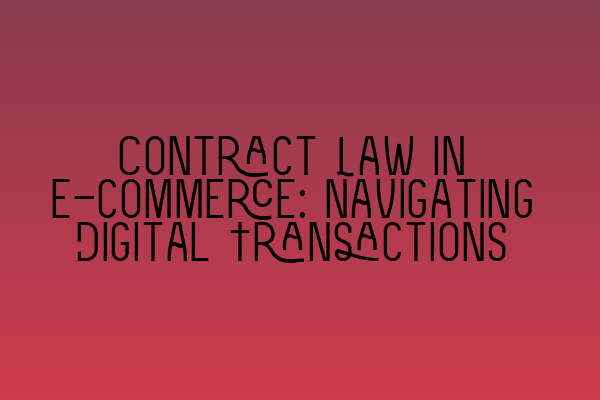Contract Law in E-commerce: Navigating Digital Transactions
In today’s rapidly evolving digital landscape, e-commerce has become an integral part of doing business. With the ongoing rise in online transactions, it is crucial for both consumers and businesses to understand the complexities and legal implications of contract law in e-commerce. From online purchases to service agreements, digital transactions require careful consideration and adherence to legal principles to ensure a smooth and legally binding transaction.
At SQE Contract Law, we understand the importance of navigating contract law in the realm of e-commerce. As a solicitor, writer, and SEO expert, I am here to guide you through the intricacies of contracting in the digital world. In this blog post, we will explore key aspects of contract law in e-commerce and provide you with valuable insights to make informed decisions in your online business transactions.
Formation of Contracts in E-commerce
The formation of a contract in e-commerce follows the same fundamental principles as traditional contracts. An offer, acceptance, consideration, and intention to create legal relations are the essential elements of a contract. However, in the context of digital transactions, these elements are often manifested differently. Let’s delve deeper into each component:
1. Offer: In e-commerce, an offer is typically made through product descriptions, pricing, and terms listed on a website or online platform. By displaying products or services and their prices, businesses invite customers to make an offer by adding items to their virtual shopping carts or submitting an online form.
2. Acceptance: Acceptance in e-commerce is usually manifested when a customer clicks the “Buy Now” or “Proceed to Checkout” button, confirming their intention to purchase. However, the timing and nature of acceptance can vary in different jurisdictions, so it is advisable to seek legal advice specific to your jurisdiction.
3. Consideration: Consideration refers to the exchange of something valuable between the parties involved in the contract. In e-commerce, the consideration is typically the payment made by the customer in exchange for the product or service being offered.
4. Intention to Create Legal Relations: E-commerce transactions are presumed to have an intention to create legal relations, as customers and businesses enter into agreements with the expectation that their rights and obligations will be legally enforceable.
The Importance of Clear and Transparent Terms and Conditions
In the realm of e-commerce, terms and conditions play a pivotal role in defining the rights and obligations of both parties. It is essential for businesses to have well-drafted and clearly visible terms and conditions on their websites or online platforms. These terms may cover various aspects such as payment methods, delivery, returns and refunds, warranties, data protection, and dispute resolution mechanisms.
By providing clear and transparent terms and conditions, businesses can mitigate the risk of misunderstandings or disputes arising from the contractual relationship. Furthermore, well-drafted terms and conditions can help businesses ensure compliance with consumer protection regulations and other relevant laws.
Contract Validity and Electronic Signatures
In e-commerce, contracts are often formed through electronic means, raising the question of the validity and enforceability of electronic signatures. The use of electronic signatures is recognized and governed by various legal frameworks, such as the Electronic Communications Act 2000 in the UK and the eIDAS Regulation in the European Union.
These legal frameworks ensure that electronic signatures are legally valid and equivalent to traditional pen-and-paper signatures, provided they meet certain requirements. For example, the signature must be linked to the signatory, capable of identifying the signatory, created using means under the signatory’s control, and sufficiently reliable to ensure the integrity of the signed document.
Consumer Protection in E-commerce
Consumer protection is a paramount consideration in e-commerce transactions. Consumers are often protected by specific legislation and regulations aimed at safeguarding their rights, such as the Consumer Rights Act 2015 in the UK and the Consumer Rights Directive in the European Union.
These laws confer certain rights on consumers, such as the right to clear information about the product or service, the right to cancel a purchase within a specified period (the cooling-off period), and the right to a refund or replacement of faulty goods. It is crucial for businesses to be aware of and comply with these consumer protection laws to avoid legal repercussions and maintain positive customer relationships.
Dispute Resolution and Online Dispute Resolution (ODR)
In the event of a dispute arising from an e-commerce transaction, it is advisable to first attempt to resolve the matter amicably through direct communication. However, if an agreement cannot be reached, alternative dispute resolution methods, such as mediation or arbitration, may be pursued.
In the digital era, online dispute resolution (ODR) platforms offer a convenient and efficient way to resolve disputes without resorting to traditional court proceedings. ODR platforms provide an online environment where parties can present their case, exchange evidence, and engage in negotiations with the assistance of mediators or arbitrators. Utilizing ODR platforms can save time, cost, and provide a more flexible approach to dispute resolution.
Conclusion
As e-commerce continues to shape the way we conduct business, understanding contract law in the digital realm is essential for both consumers and businesses. By acknowledging and adhering to the key principles of contract formation, implementing clear and transparent terms and conditions, recognizing the validity and enforceability of electronic signatures, and complying with consumer protection regulations, you can navigate the complexities of contract law in e-commerce successfully.
At SQE Contract Law, we are committed to providing comprehensive legal services and guidance to businesses and individuals venturing into the world of e-commerce. For further exploration and preparation for your legal journey, we recommend checking out our related articles on SQE 1 Practice Exam Questions, SQE 1 Practice Mocks FLK1 FLK2, SQE 2 Preparation Courses, SQE 1 Preparation Courses, and SRA SQE Exam Dates.
Remember, in this fast-paced digital age, staying informed, attentive, and legally compliant will help you seize the endless opportunities that e-commerce has to offer. Always consult qualified legal professionals to ensure your digital transactions are legally secure and protect your rights and interests.
